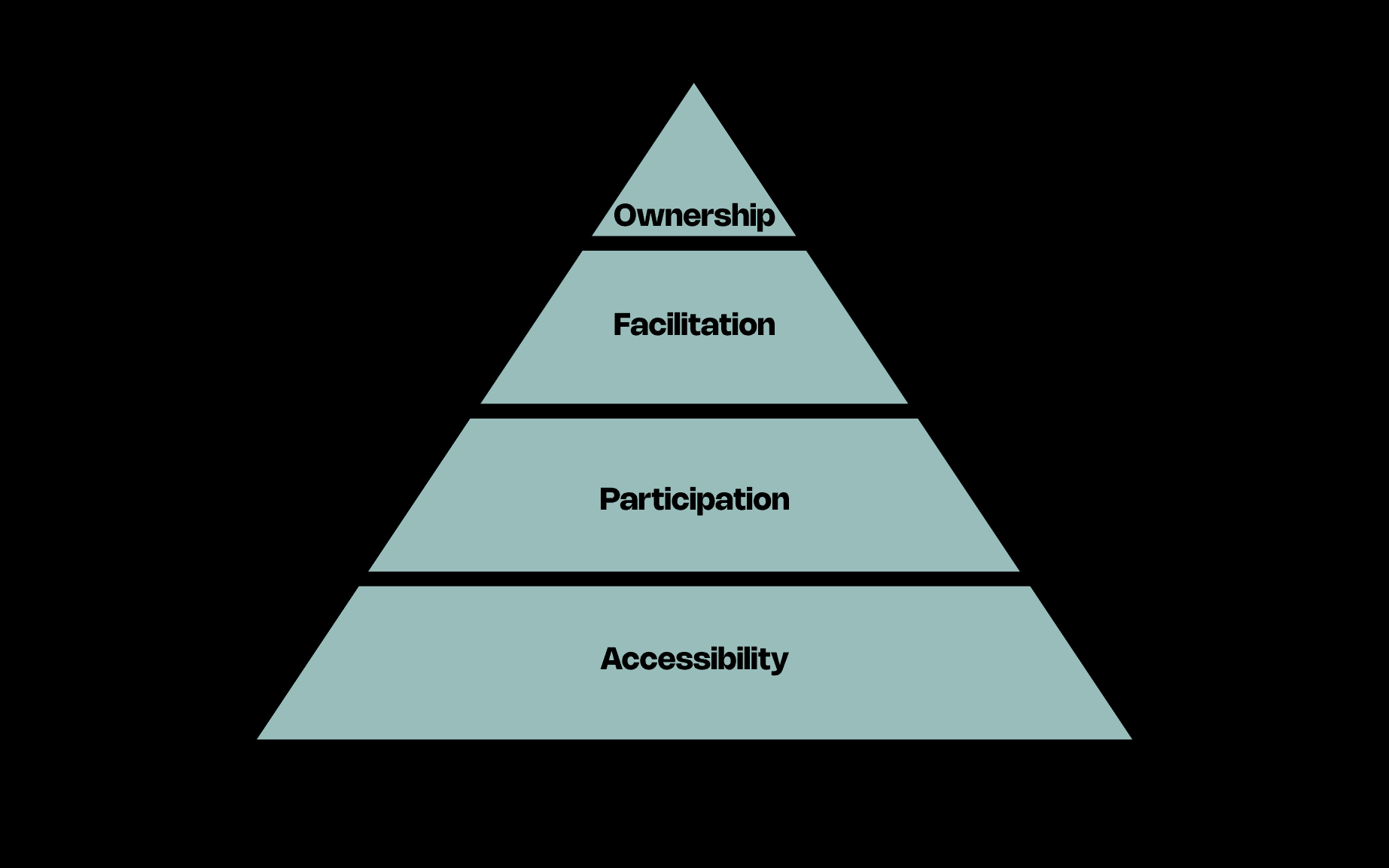UX Design
Baked Studio
19/07/2023
5 minutes
Recognizing the criticality of user research, it is essential to ensure that we are tackling the correct problem, for the right user, with a suitable solution based on accurate assumptions—a multi-faceted challenge that demands precision.
Compounding the issue is the prevalence of insufficient UX specialists compared to the actual demand.
To address this, one solution is to involve the entire team in the research process, a concept known as UX research democratisation.
However, discussing such a broad and ambiguous term can be challenging. To provide a more concrete understanding, I typically categorize UX research democratisation into four distinct types.
The purpose of this article is to offer a well-defined framework that facilitates discussions surrounding UX research democratisation, making them more accessible and meaningful.

Level 1: Democratising Access
The most straightforward and widespread form of UX research democratisation involves granting access to research artifacts for everyone within the team.
This accessibility allows team members to view and utilize various research materials, such as interview recordings, survey results, usability test findings, raw data, and more. However, access alone is not sufficient for true democratisation.
In addition to providing access, it is crucial to foster a team culture that actively encourages the utilization of these artifacts to generate insights and stimulate discussions.
Merely providing view access does not embody the essence of democratisation.
Pros:
Relatively easy to implement.
Low risk involved.
A simple method to break down silos.
Cons:
Teams often fail to review research outcomes without external prompts.
Level 2: Democratising Participation
When discussing research democratisation, it often refers to democratising participation, aiming to allow and encourage everyone on the team to actively engage in the research process, often in a supportive role.
At this level, team members are encouraged to take part in various research activities, such as being note-takers during user interviews, observers during usability studies, or participants in field research. They can also contribute to post-research tasks like preparing interview transcripts, timestamping important moments in user tests, or identifying interesting quotes.
This form of democratisation enables the entire team to gain firsthand exposure to user pain points, making users more tangible and facilitating empathy-building without compromising the study's quality. It also allows UX researchers to focus on understanding users instead of solely taking notes. Additionally, it passively trains team members in UX practices and enhances their overall understanding of the UX discipline.
Pros:
Provides firsthand experience of user pain points for everyone on the team.
Makes users more tangible, fostering easier empathy.
Frees up UX researchers to focus on user understanding.
Passively educates team members in UX practices.
Builds a deeper comprehension of UX principles.
Cons:
Requires additional time and effort from the entire team.
May undermine the credibility of UX researchers if research activities appear easy from a supportive role.
Risks reducing the quality of research artifacts if non-researchers are responsible for creating them (e.g., notes).
Level 3: Democratising Facilitation
Democratising user research facilitation empowers everyone on the team to independently conduct their own research studies.
While UX researchers still play a role in planning and overseeing the research process, their focus shifts towards the broader picture rather than facilitating every individual study.
Level 3 democratisation is worth exploring when there is a need to significantly increase research capacity or enhance cross-functionality within the team.
However, it is important to acknowledge that studies conducted by non-researchers tend to have lower quality. Becoming a UX professional involves more than just facilitating a session, so caution should be exercised.
Pros:
Increases research capacity, enabling testing of more assumptions and hypotheses.
Frees up researchers' time for strategic and high-level work.
Enhances cross-functionality within the team.
Cons:
Risks compromising participant safety and experience.
Introduces bias and potentially lowers the quality of research.
Requires even more effort from the entire team.
Level 4: Democratising Ownership
The epitome of user research democratisation — a cherished aspiration.
Through democratisation, everyone in the team is empowered to plan their own studies. If a quality assurance analyst has doubts about a recent feature, they can set up a spontaneous usability session. Similarly, if a developer wants to gain a deeper understanding of the problem they're addressing, they can facilitate a user interview.
This approach propels UX researchers towards becoming more of mentors and strategic research managers, rather than simply orchestrating specific research activities.
The desirability of such a level of democratisation, however, is a separate question.
Let's be real. This might not be viable in most situations. But, for small groups equipped with the right research skills, it could yield interesting results. At a minimum, it's a captivating theory to ponder.
Advantages:
Elevates UX researchers to positions of mentors, educators, and strategic leaders.
Enhances team empowerment, leading to increased motivation.
Disadvantages:
Diminishes the scrutiny over the UX research process, potentially resulting in a decline in its quality.
Absence of centralised coordination might lead to less effective research plans and repeated studies.
Finding Balance
Each of these stages necessitates careful calibration.
Democratisation cannot substitute for the years of training and expertise needed to excel in the role. Becoming a researcher isn't within everyone's capacity.
However, conversely, not every situation calls for a professional user researcher.
Employ different levels of democratisation to liberate your researchers from routine, low-priority tasks and enable them to concentrate on crucial elements of their roles.
Those who aren't researchers could concentrate on tasks that don't demand rigorous research skills and whose results won't drastically alter the product. These could include:
Conducting weekly exploratory interviews.
Observing sales calls.
Reviewing customer service tickets.
Performing moderated usability tests.
This approach would give your accomplished researchers more bandwidth to focus on pivotal tasks such as:
Initial product discovery.
Confirmation of core assumptions.
Planning of discovery/research strategy.
In conclusion, the objective of UX research democratisation is not to transform every team member into a UX researcher, but to permeate UX research throughout the organization.
The mission of UX research democratisation is not to create a cadre of UX researchers, but rather to infuse UX research across the entire organization.
© 2024, Baked Design
Baked with ❤️ and dedication!
